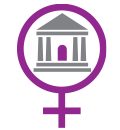 Pacific \ Women in local government
Pacific \ Women in local government
Gender equity is a priority for CLGF members and the Commonwealth. The Commonwealth is working towards gender equity and has set a target of a minimum of 30 per cent of women in public life – both in elected leadership positions and administration – including at the local level. A key focus is developing strategies to increase women's participation in decision making.
Featured
Eight key messages to promote sustainable mobility from a gender perspective in our cities ∗
Eight key messages from Metropolis - the world assoication of the major metropolises - to promote sustainable mobility from a gender perspective in our cities
Author: Metropolis Publisher: Metropolis Publication year: 2016
E-government for women’s empowerment in Asia-Pacific ∗
This ESCAP report examines three elements of e-government: service delivery, citizen uptake and connectivity. It finds that requirements for gender-responsive e-government include: investments in both data and connectivity; intermediaries who build women’s trust in online service delivery; and subsidised access and safe, inclusive public spaces. The report draws on experiences from Australia, Fiji, India, the Philippines and the Republic of Korea.
Author: United Nations Economic and Social Commission for Asia and the Pacific Publisher: United Nations Economic and Social Commission for Asia and the Pacific Publication year: 2016
Reflections on the Local Government (Community Well-Being) Amendment Bill
Measuring Local Well-being: reflections on the Local Government (Community Well-Being) Amendment Bill. The Local Government (Community Well-being) Amendment Bill is designed to provide local authorities with greater legal freedom to make investments that will raise the well-being of their local community. The legislation is predicated on the assumption that people’s well-being is influenced by their local context. In order to identify the influence of changes in context generated by local investments, it is necessary to recognise that individuals differ in many ways and that the impact of any given investment can vary substantially from one person to the next. Indicators based on collections of individuals miss much of that variation. It is also necessary to recognise the variety of ways well-being can be measured. This short article raises both these issues by exploring three measures of well-being currently available on the 2018 Quality of Life survey.
Author: Philip S. Morrison Publisher: Policy Quarterly Publication year: 2019
Women in local government: stories of inspiration from Fiji
This booklet celebrates the achievements and important contributions women make to local government and their communities. It showcases to the sector and wider community the diversity, competence, influence, dedication and passion of both current and past female local government employees and councillors. The challenges faced by the women in this publication are also real and highlights the need change on a number of levels.
Author: CLGF Pacific Publisher: CLGF Publication year: 2017
A Human Rights Approach to Localising The MDGs Through Gender-Equitable Local Development
Until now, the United Nations Capital Development Fund’s (UNCDF) Gender Equitable Local Development (GELD) programme has not been presented within an explicit human rights framework. This is strange given that the human rights based approach to development (HRBAD) aims to ensure that all human beings can live their lives fully and with dignity. HRBAD is fundamentally about the healthy and full development of individuals and communities. In addition, one of human rights’ central concerns is that people have equal access to the benefits of society. Initiatives to realize human rights therefore give priority to the most marginalized - the poorest - in a society. It is those individuals who have most difficulty in securing the basics that are essential to living their lives with dignity. Women in all communities are disproportionately represented among the poor. Thus, human rights have gender equity as a central focus. Put another way, we are dealing with the feminization of poverty. We are dealing with the concept of equal access (to development). In short, we are dealing with those who need (and deserve) greater priority in access to infrastructure and supporting services in order to reach a point of equality.
Author: Ron McGill Publisher: Commonwealth Journal of Local Governance Publication year: 2009



